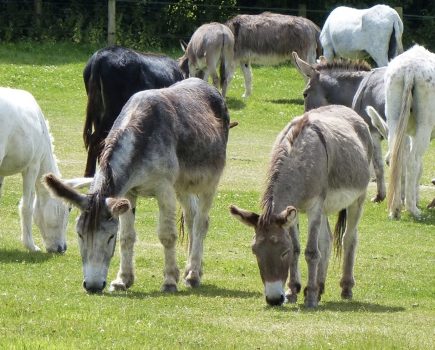APRIL 7, 2014: Food swapping schemes are proliferating – and smallholders are in the thick of it. Andrea Mynard reports
Turning up at a local farm on a Sunday morning with jars of homemade chutney and walking away with horseradish, parsnips and jam may not be a typical way of doing the weekend shopping. Yet with more people passionate about food and where it comes from, produce swapping is growing in popularity in the UK. Whether swapping honey for ham, bread for jam or apples for eggs, it can be a great way for smallholders to benefit from their hard-earned efforts. Claire Jeffery, who set up The Great Cotswold Food Swap at her family farm with her friend, Lettie Elwin, says: “You turn up with a bag of apples or a tray of eggs and walk away with a whole bunch of produce you’ve paid nothing for – it’s quite exciting!” You do somehow walk away from these community swapping events chuffed with your bounty and feeling that you’re taking away more than you’ve brought. Vicky Swift, who helps organise Applesforeggs.com, a community Food Swap in Altrincham, Cheshire, puts it down to a simple division of labour: “It’s an almost magical formula, and it comes down to an understanding of the time and effort that goes into the produce. It might take me a couple of hours to make six jars of jam – but if I swap those six jars for, say, some cherry tomatoes, a bottle of elderflower cordial, some flapjacks, a sourdough loaf, a batch of muffins and a bag of runner beans, I can’t help but feel I’m absolutely the winner. You can’t produce all that in two hours – whereas you can make the six jars of jam. I suppose it’s like division of labour, across a food swapping community.” Vicky, a bread-making, allotment-keeping Mum, set up Apples for Eggs in 2011 after finding that she had surplus allotment produce. “I thought there must be plenty of people around locally who would love to get their hands on some of this lovely fresh stuff – or perhaps even my bread! I decided to set up a Facebook page called Apples for Eggs, and try to encourage people to swap their produce that way. It worked to a certain degree, but soon became very clear to me that face-to-face events where people could bring their produce, socialise a little and share taster samples of food would be far more effective – and more fun.” Having begun online research, Vicky soon discovered the very beginnings of the Food Swapping Movement in the US – the LA Food Swap and the BK Swappers in Brooklyn. She decided to follow their format and the first Apples for Eggs Food Swap was held in Altrincham in autumn 2011. Vicky’s friend Sue Jewitt then took up the idea in York, and Apples for Eggs now has swaps taking place in six, soon to be seven locations across the country. Produce is wonderfully varied depending on the seasons. Vicky says she normally takes along homemade bread, a selection of whatever preserves and cordials she’s been making and any surplus fresh produce such as potatoes, runner beans, rhubarb or gooseberries. Edible goodies from the hedgerows and woods can be included too: “I’ll also take foraged food if there’s any around – probably wild garlic at the forthcoming spring swap.” Cotswolds based Claire Jeffery, who already sells apple juice, eggs and home-produced Leyn Lamb from her own ‘farm gate shop’ was similarly inspired by American food swap initiatives. Claire felt passionately that, although there hadn’t been any community Food Swaps in the South West, the Cotswolds had some great food to offer: “We were keen to bring together the local community and local foodies.” Claire teamed up with Lettie Elwin to organise the first Cotswold Food Swap in South Cerney, Gloucestershire, in September 2013. Lettie champions great local businesses and had already organised a successful ‘Buy Local’ campaign. Both are interested in sustainability and are passionate foodies. Claire says: “A food swap fits perfectly with our farm’s ethos and is a really practical way to exchange excess food for other edible goods.” Lettie agrees: “Food swaps are a great way of bringing like-minded food lovers together.” Following the success of the September Cotswold Food Swap, where lots of locals brought along a vast array of produce from their gardens and allotments, including marrows, onions and garlic, Claire and Lettie organised another Swap in December. They feared that there may be a dearth of produce in the winter, but needn’t have worried: an amazing array of produce included a brace of pheasants, Christmas biscuits, parsnips, homemade mincemeat and fudge. Claire made lavender bags with lavender she’d picked in her garden and also brought along her own chutney. She says: “People were so inventive.One canny smallholder brought along frozen fruit in ice cooler bags and made some of her frozen fruit from the summer into pies. Another lady brought homemade cordial made with her home-grown blackcurrants.” The Swaps normally last about two hours; the first hour is about sampling and chatting to the other participants, and lots of recipes and tips are exchanged. After that it’s time to place bids. Swappers weigh up their offers and then exchange their goods. It normally takes around another hour for all swaps to be completed. As long as produce is homegrown, homemade or foraged, it can be brought along and no money changes hands; the only currency is produce. During the time when swappers weigh up their offers, further bartering can take place. You can decide that you’d like to swap cakes for carrots but suggest that you’d like more carrots or perhaps reject an offer altogether if you’re not happy with it. Thanks to the lovely vibe of a food swap, and the fact that you only turn up for a sociable couple of hours and walk away with lots of produce, you generally end up going with the flow though. You do need to be aware that there are no guarantees at a Food Swap. Home kitchens are unlikely to be guaranteed nut-free or have Food Standards Agency guarantees of cleanliness – although everyone taking part does have to sign a declaration agreeing that they’ve complied with certain hygiene standards. But if you turn up armed with some fresh produce and an open mind you may find that not only do you come away with armfuls of goodies, you may get new recipes and ideas too. Hopefully you will have a far more interesting, cheaper and sociable time than dashing around the supermarket! MORE: www.applesforeggs.com For further details about the Great Cotswolds Food Swaps see www.berryfarmcotswolds.co.uk PHOTO: Clare Jeffery and Lettie Elwin who organise the Great Cotswold Food Swap







